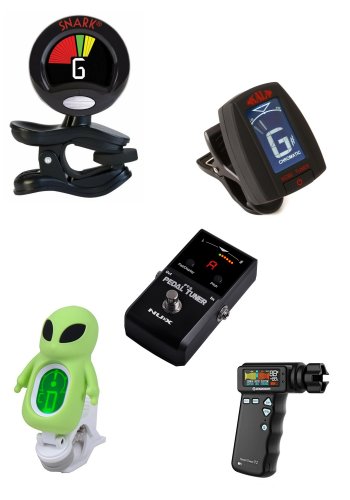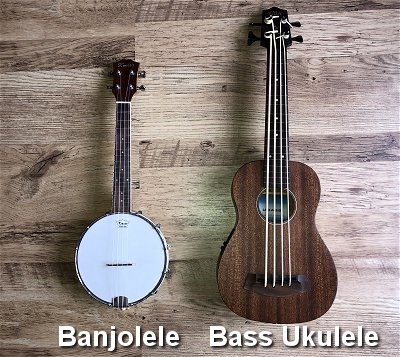Frequently Asked Ukulele Questions And General Ukulele Information |
| If you are new to the uke, hopefully you will find answers to some of the most frequently asked questions beginners have when they start on their ukulele journey. |
|
 |

The ukulele is a four-stringed musical instrument made from wood that resembles a small classical guitar. The ukulele was born in Hawaii but has its roots in Western Europe. Immigrants from Portugal at the end of the 19th century took their culture and musical instruments to Hawaii. The ukulele was originally developed from a Portugese instrument called the 'machete'. It is typically tuned GCEA with the G being tuned above the C.
So, what does ukulele mean? Interestingly, ukulele means "jumping flea." The name was given because of its small size, and vibrant, cheerful, and exuberant sound.
|
|

|
The ukulele is small, light and easy to hold whether sitting down or standing up. It does not require a lot of physical strength. It gives a perfect introduction to melody, harmony and rhythm. It is a relatively inexpensive instrument to buy as you start playing and it’s a social instrument, people tend to meet and play whether in groups, clubs, jams and festivals.
Most importantly though - THE UKULELE IS FUN!
|
|

|
-
Which ukulele should I buy?
When you are buying a ukulele there are two questions that you need to answer to start with.
Yes, ukuleles are inexpensive compared to many other musically instruments however the instrument still needs to be playable!
For a younger child, by spending £25 - £45 you can buy a coloured soprano ukulele from the likes of Octopus and the Makala Dolphin ukes from Kala.
For older children and adults the size (see below) will make a difference to the price but a concert ukulele is a good place to start and by spending ideally upwards of around £40 is going to get you a playable ukulele. By spending a little more and looking at around £80 and upwards you will start to get a much bigger range of named, quality instruments.
** Please remember, the instrument being set up correctly can make the world of difference. **
- What size ukulele to buy?
There are four main sizes of ukulele. There will be information about the bass ukulele further down the page.
- Soprano: At only 21" in size, with 12 - 15 frets, sopranos are the smallest (and most portable!) members of the ukulele family. Often called “standard” in Hawaiia, sopranos have that classic sound immediately associated with the ukulele.
- Concert: At 23", they might be only 10% larger than sopranos, but concert ukuleles are louder, warmer in tone, and definitely easier to play if you have large hands. Plus, the larger neck, typically with 15 - 18 frets, allows concerts to reach higher notes than sopranos.
- Tenor: At 26", larger still in size and volume, tenors are a very popular member of the ukulele family. With up to 19 frets, a tenor can do everything a concert can, and more. Tenors are especially well-suited for trying alternate tunings, making them especially attractive for solo playing.
- Baritone: The largest members of the ukulele family at 30", baritones are usually tuned like the four top strings of a guitar, making them perfect for guitar players who wish to step into the ukulele world without having to relearn all the chords. Baritones have a very warm sound that reminds you of a classical guitar.
|
**Soprano, concert and tenor ukuleles are all tuned the same. The baritone is different.**
|
|

|
-
Where should I buy a ukulele from?
If at all possible, it is better to go to a local music shop for several reasons. Firstly, it is better to be able to try an instrument before you buy it or even try a few to see what it is most suitable. Also you'll be given advice, be supporting a local business and possibly even have the ukulele set-up properly.
It isn't always possible to buy locally for various reasons, there are many different options for buying on-line:
- Probably the safest and best way (but not necessarily the cheapest) is to buy from a specialist ukulele shop. This way you will be dealing with knowledgeable staff who are happy to offer advice and you'll get a decent instrument rather than an "unknown" brand. Very often the prices are reasonable on beginner instruments so definitely worth looking at. A few links here: Resources
- There are many online music shops (non-specialist) which also sell ukuleles, indeed some of these offer a large range of instruments, from beginners to top quality ukes. Often prices are competative, especially from the larger stores, and you again have the guarantee of buying from an established shop in case of any problems. You won't however get much specialist advice and it is unlikely the instrument would have received any further setting-up.
- Both Amazon and Ebay sell a huge number of ukuleles and are often considered when buying a first instrument. The ease of buying a "package" or very often the cheap prices will mean that it is first choice for many buyers. Please consider the following points if you are going to buy a ukulele from Amazon or Ebay - Very cheap ukuleles are probably going to be unplayable. Often the instruments are located in China so you can expect a wait of a few weeks for delivery. There can be quality issues and these can be difficult to resolve, especially if you are dealing with a seller located in a different country. Having said that, there are many decent sellers on both Ebay and Amazon and personally, I have bought ukuleles (and many other instruments) from both.
Having bought ukuleles from all of the above sources my main advice would be to do your research as much as possible, don't be afraid to ask for advice and "if it is too good to be true, you probably shouldn't buy it."
|
|

|
Making sure your ukulele is in tune is one of the most important steps to playing ukulele.
There are various methods; using an electronic clip-on tuner, using one of the various available apps or you can tune by ear listening to the notes played on a piano. Many electric ukuleles have in-built tuners and you can also plug them into a tuning pedal.
Learn the name of the strings - this is essential for tuning your ukulele. A - E - C - G
 |
- The clip on tuners are probably the easiest option. They can be relatively inexpensive and easy to use.
- Switch the tuner on, some have options for different instruments, look for U or Uc to indicate ukulele.
- Clip the tuner to the head of the ukulele. Make sure you know which string goes to each peg. Gently pluck the string and slowly turn the peg a little bit at a time until the the string is in tune.
For teachers or group leaders I can recommend the Jowoom T2 Smart Automatic Tuner if you have multiple ukuleles to tune quickly or are changing a lot of strings.
|
Here are a few links to online ukulele tuners
||: Uke-Tuner
||: UkuTuner
||:
Uke Buddy
||:
Ukulele Tricks
||:
Ukulele Buddy
||: Tuner Online |
 |
|
|

|
-
Can I use a pick or plectrum?
It is better to learn to play using your fingers and thumb but there are times when you may need to use a plectrum, if you have a sore finger for example. Use a leather or felt plectrum or if you do need to use one, they sound nicer and are less likely to cause damage to your ukulele.
|
|

|
-
What straps can be used on a ukulele?
Many ukulele players do not use straps, especially when playing a soprano or concert ukulele but using a strap does offer support when playing, and is a necessity when using a larger ukulele. Ukulele straps tend to be narrower than a guitar strap. There are a number of different types of straps that can be used with your ukulele:
|
|

|
A bass ukulele or "u-bass" is roughly the same size as a baritone ukulele. The strings are made of polyurethane and are much thicker than normal ukulele strings. The bass ukulele has the same strings and plays at the same pitch as both the double bass and bass guitar. As far as I know, all bass ukuleles are electric or electro-acoustic and can be fretted or fretless.
A banjolele is a cross between a banjo and a ukulele. The body is similar to a banjo with a stretched skin head but the neck on the banjolele is fretted like a ukulele with 4 strings and is shorter than a traditional banjo. The banjolele is generally the same size as a concert ukulele.
|
 |
|

|
-
Am I too old or too young to start playing?
The short answer is no! The long answer is nooooooooooooooooooooooooo!
Very young children love the colourful "tiny guitar" and will often pick up the basics very quickly. In the classroom, both younger and older children alike enjoying making music as a group.
It is not only the youngsters that play ukulele! With the popularity of the ukulele growing over the last few years so has the number of adults and especially older ladies and gentlemen learning and playing the ukulele, indeed many groups are specially aimed at retired and senior citizens. It is a very socialable instrument and a great way to meet new friends and get involved with the local community. It is NEVER too late to start learning the ukulele!
|
|
|
|
![]()
